PSY112 Individual Assignment: Erikson's Psychosocial Development
VerifiedAdded on 2023/01/04
|7
|1447
|83
Homework Assignment
AI Summary
This individual assignment from PSY112, Introduction to Psychology, analyzes the student's personal development through Erikson's Psychosocial Theory of Development. The student, a 20-year-old male, examines how they have progressed through Erikson's eight stages, from trust vs. mistrust to intimacy vs. isolation. The analysis details how early experiences, such as a lack of parental interaction and domestic violence, influenced the development of mistrust and introverted tendencies in the initial stages. The student reflects on the impact of these experiences on subsequent stages, including autonomy vs. shame, initiative vs. guilt, industry vs. inferiority, and identity vs. role confusion. The assignment also explores current challenges in forming relationships, linking these struggles to earlier conflicts. The student supports their analysis with references to scholarly articles, demonstrating an understanding of the theory's application to their life course. The assignment highlights how early childhood experiences can shape personality and influence later life choices, such as academic and career paths. The student's reflection provides a detailed and insightful application of Erikson's theory, demonstrating a clear understanding of the concepts and their personal relevance.
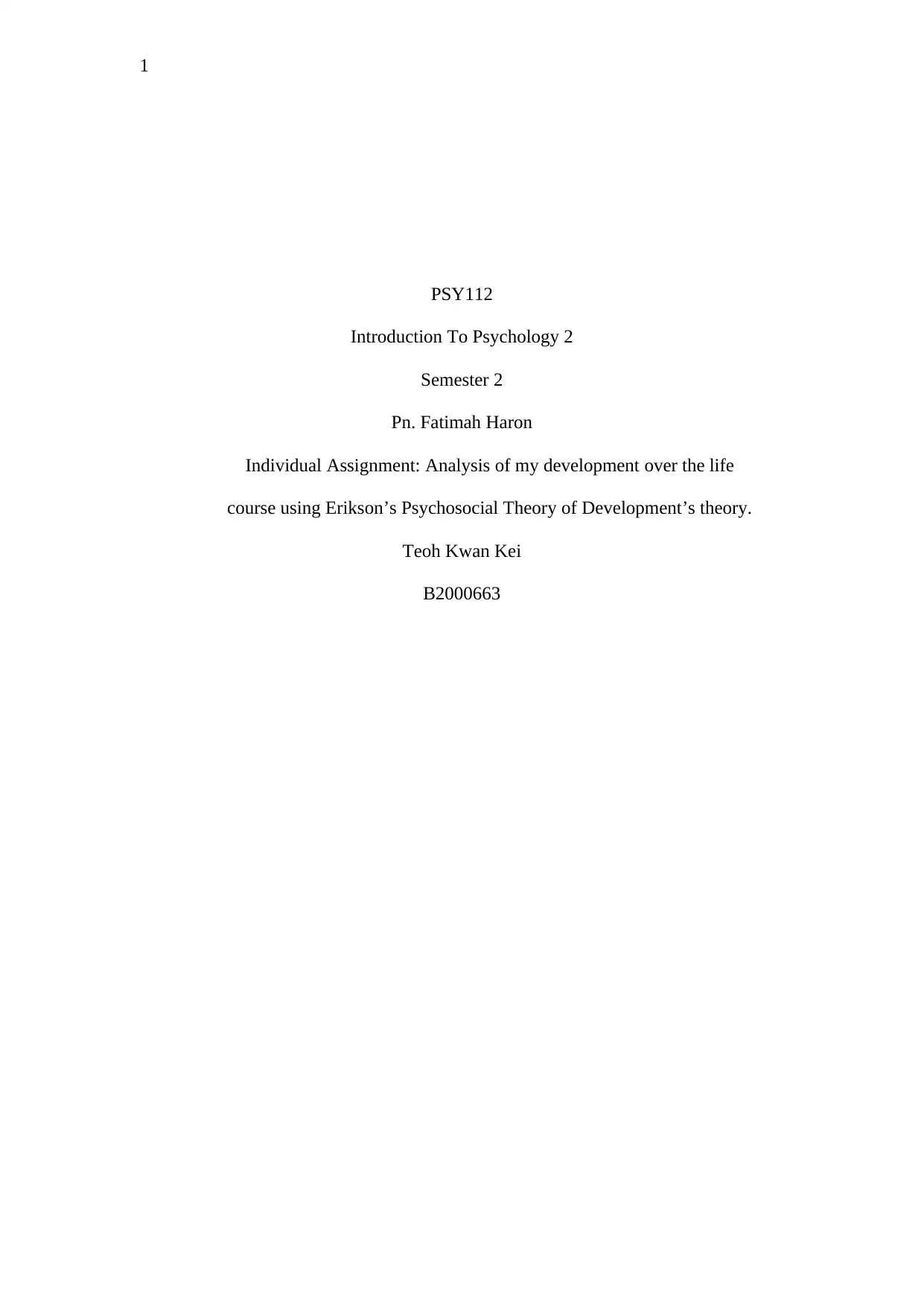
1
PSY112
Introduction To Psychology 2
Semester 2
Pn. Fatimah Haron
Individual Assignment: Analysis of my development over the life
course using Erikson’s Psychosocial Theory of Development’s theory.
Teoh Kwan Kei
B2000663
PSY112
Introduction To Psychology 2
Semester 2
Pn. Fatimah Haron
Individual Assignment: Analysis of my development over the life
course using Erikson’s Psychosocial Theory of Development’s theory.
Teoh Kwan Kei
B2000663
Paraphrase This Document
Need a fresh take? Get an instant paraphrase of this document with our AI Paraphraser
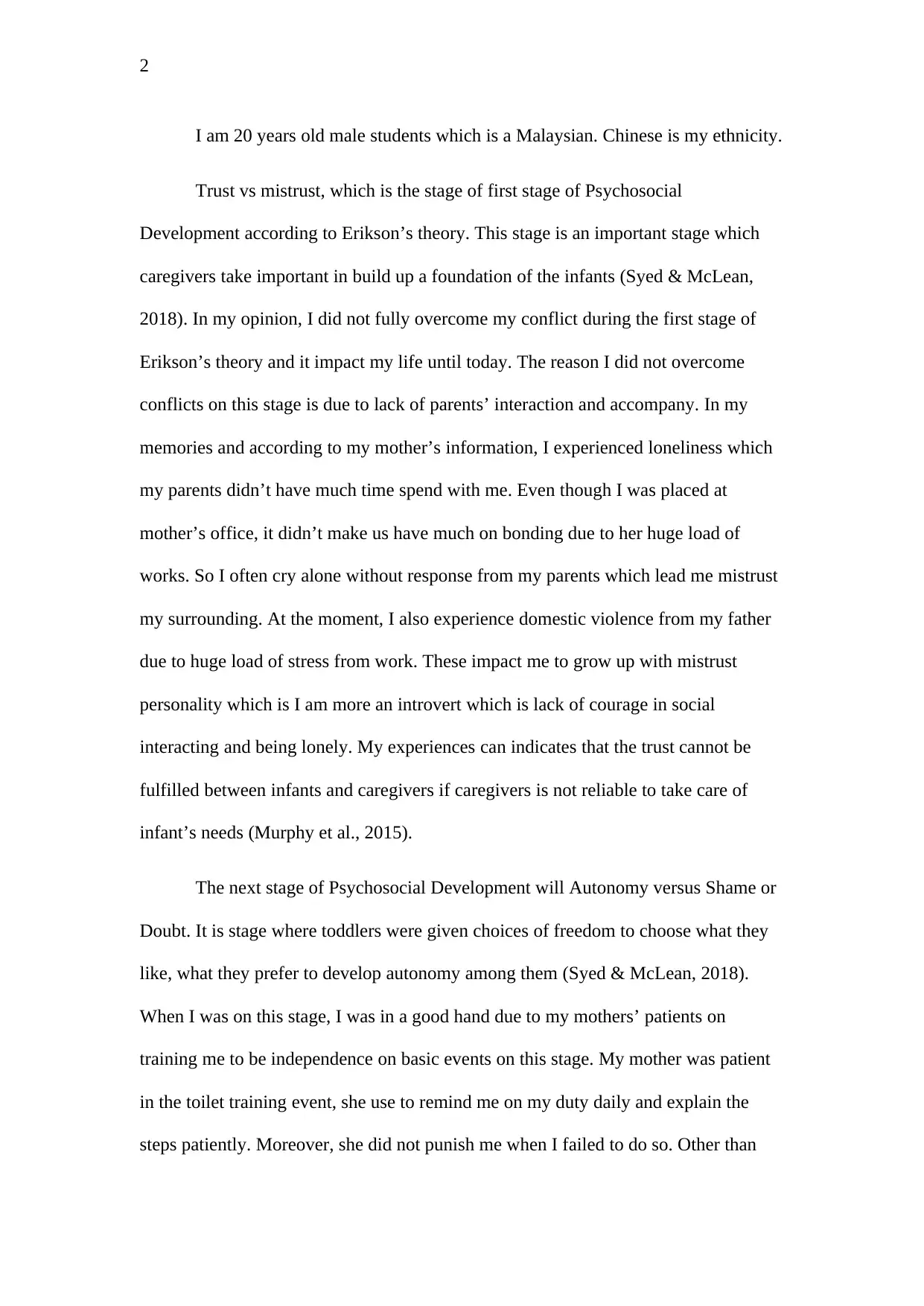
2
I am 20 years old male students which is a Malaysian. Chinese is my ethnicity.
Trust vs mistrust, which is the stage of first stage of Psychosocial
Development according to Erikson’s theory. This stage is an important stage which
caregivers take important in build up a foundation of the infants (Syed & McLean,
2018). In my opinion, I did not fully overcome my conflict during the first stage of
Erikson’s theory and it impact my life until today. The reason I did not overcome
conflicts on this stage is due to lack of parents’ interaction and accompany. In my
memories and according to my mother’s information, I experienced loneliness which
my parents didn’t have much time spend with me. Even though I was placed at
mother’s office, it didn’t make us have much on bonding due to her huge load of
works. So I often cry alone without response from my parents which lead me mistrust
my surrounding. At the moment, I also experience domestic violence from my father
due to huge load of stress from work. These impact me to grow up with mistrust
personality which is I am more an introvert which is lack of courage in social
interacting and being lonely. My experiences can indicates that the trust cannot be
fulfilled between infants and caregivers if caregivers is not reliable to take care of
infant’s needs (Murphy et al., 2015).
The next stage of Psychosocial Development will Autonomy versus Shame or
Doubt. It is stage where toddlers were given choices of freedom to choose what they
like, what they prefer to develop autonomy among them (Syed & McLean, 2018).
When I was on this stage, I was in a good hand due to my mothers’ patients on
training me to be independence on basic events on this stage. My mother was patient
in the toilet training event, she use to remind me on my duty daily and explain the
steps patiently. Moreover, she did not punish me when I failed to do so. Other than
I am 20 years old male students which is a Malaysian. Chinese is my ethnicity.
Trust vs mistrust, which is the stage of first stage of Psychosocial
Development according to Erikson’s theory. This stage is an important stage which
caregivers take important in build up a foundation of the infants (Syed & McLean,
2018). In my opinion, I did not fully overcome my conflict during the first stage of
Erikson’s theory and it impact my life until today. The reason I did not overcome
conflicts on this stage is due to lack of parents’ interaction and accompany. In my
memories and according to my mother’s information, I experienced loneliness which
my parents didn’t have much time spend with me. Even though I was placed at
mother’s office, it didn’t make us have much on bonding due to her huge load of
works. So I often cry alone without response from my parents which lead me mistrust
my surrounding. At the moment, I also experience domestic violence from my father
due to huge load of stress from work. These impact me to grow up with mistrust
personality which is I am more an introvert which is lack of courage in social
interacting and being lonely. My experiences can indicates that the trust cannot be
fulfilled between infants and caregivers if caregivers is not reliable to take care of
infant’s needs (Murphy et al., 2015).
The next stage of Psychosocial Development will Autonomy versus Shame or
Doubt. It is stage where toddlers were given choices of freedom to choose what they
like, what they prefer to develop autonomy among them (Syed & McLean, 2018).
When I was on this stage, I was in a good hand due to my mothers’ patients on
training me to be independence on basic events on this stage. My mother was patient
in the toilet training event, she use to remind me on my duty daily and explain the
steps patiently. Moreover, she did not punish me when I failed to do so. Other than
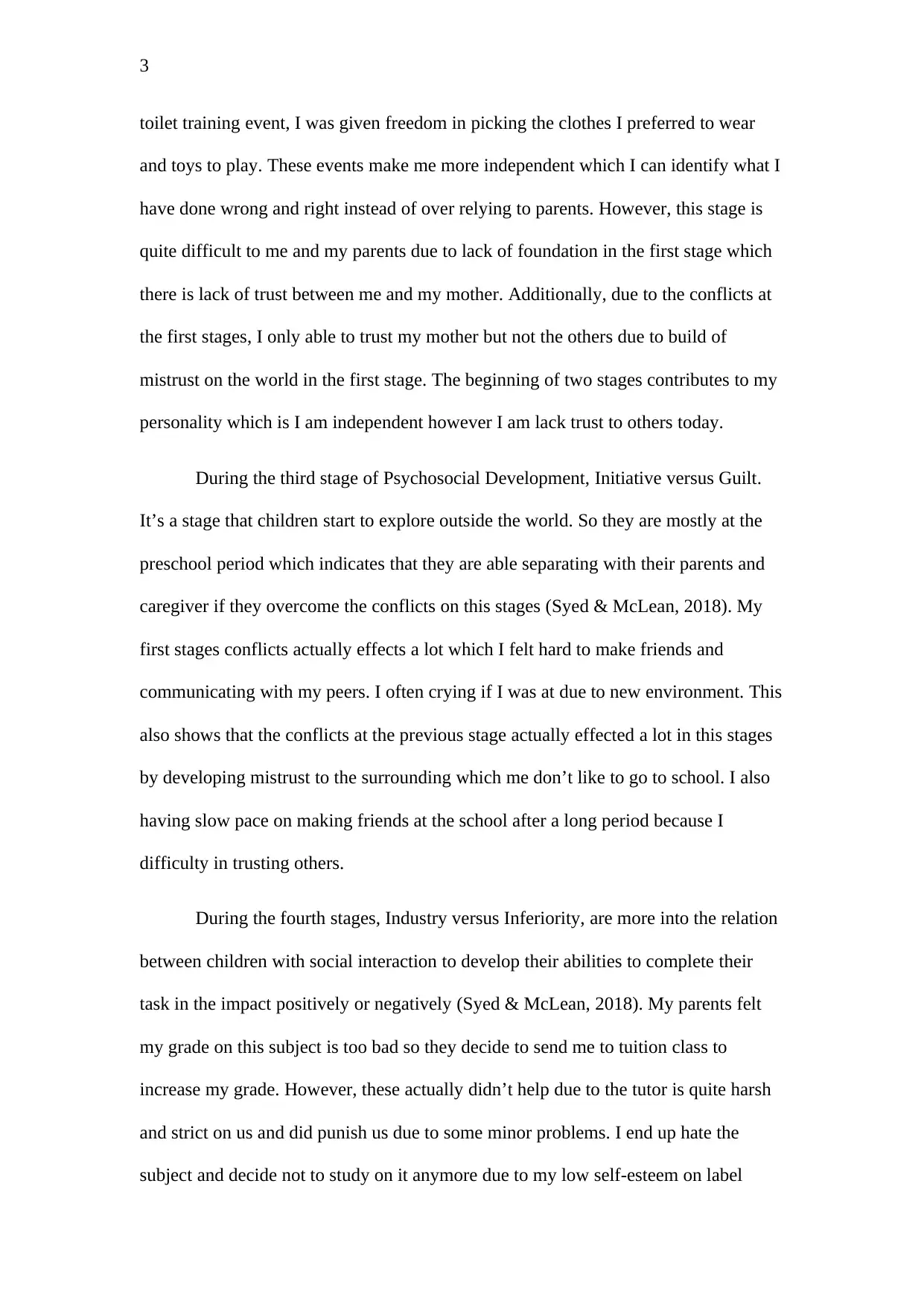
3
toilet training event, I was given freedom in picking the clothes I preferred to wear
and toys to play. These events make me more independent which I can identify what I
have done wrong and right instead of over relying to parents. However, this stage is
quite difficult to me and my parents due to lack of foundation in the first stage which
there is lack of trust between me and my mother. Additionally, due to the conflicts at
the first stages, I only able to trust my mother but not the others due to build of
mistrust on the world in the first stage. The beginning of two stages contributes to my
personality which is I am independent however I am lack trust to others today.
During the third stage of Psychosocial Development, Initiative versus Guilt.
It’s a stage that children start to explore outside the world. So they are mostly at the
preschool period which indicates that they are able separating with their parents and
caregiver if they overcome the conflicts on this stages (Syed & McLean, 2018). My
first stages conflicts actually effects a lot which I felt hard to make friends and
communicating with my peers. I often crying if I was at due to new environment. This
also shows that the conflicts at the previous stage actually effected a lot in this stages
by developing mistrust to the surrounding which me don’t like to go to school. I also
having slow pace on making friends at the school after a long period because I
difficulty in trusting others.
During the fourth stages, Industry versus Inferiority, are more into the relation
between children with social interaction to develop their abilities to complete their
task in the impact positively or negatively (Syed & McLean, 2018). My parents felt
my grade on this subject is too bad so they decide to send me to tuition class to
increase my grade. However, these actually didn’t help due to the tutor is quite harsh
and strict on us and did punish us due to some minor problems. I end up hate the
subject and decide not to study on it anymore due to my low self-esteem on label
toilet training event, I was given freedom in picking the clothes I preferred to wear
and toys to play. These events make me more independent which I can identify what I
have done wrong and right instead of over relying to parents. However, this stage is
quite difficult to me and my parents due to lack of foundation in the first stage which
there is lack of trust between me and my mother. Additionally, due to the conflicts at
the first stages, I only able to trust my mother but not the others due to build of
mistrust on the world in the first stage. The beginning of two stages contributes to my
personality which is I am independent however I am lack trust to others today.
During the third stage of Psychosocial Development, Initiative versus Guilt.
It’s a stage that children start to explore outside the world. So they are mostly at the
preschool period which indicates that they are able separating with their parents and
caregiver if they overcome the conflicts on this stages (Syed & McLean, 2018). My
first stages conflicts actually effects a lot which I felt hard to make friends and
communicating with my peers. I often crying if I was at due to new environment. This
also shows that the conflicts at the previous stage actually effected a lot in this stages
by developing mistrust to the surrounding which me don’t like to go to school. I also
having slow pace on making friends at the school after a long period because I
difficulty in trusting others.
During the fourth stages, Industry versus Inferiority, are more into the relation
between children with social interaction to develop their abilities to complete their
task in the impact positively or negatively (Syed & McLean, 2018). My parents felt
my grade on this subject is too bad so they decide to send me to tuition class to
increase my grade. However, these actually didn’t help due to the tutor is quite harsh
and strict on us and did punish us due to some minor problems. I end up hate the
subject and decide not to study on it anymore due to my low self-esteem on label
⊘ This is a preview!⊘
Do you want full access?
Subscribe today to unlock all pages.

Trusted by 1+ million students worldwide
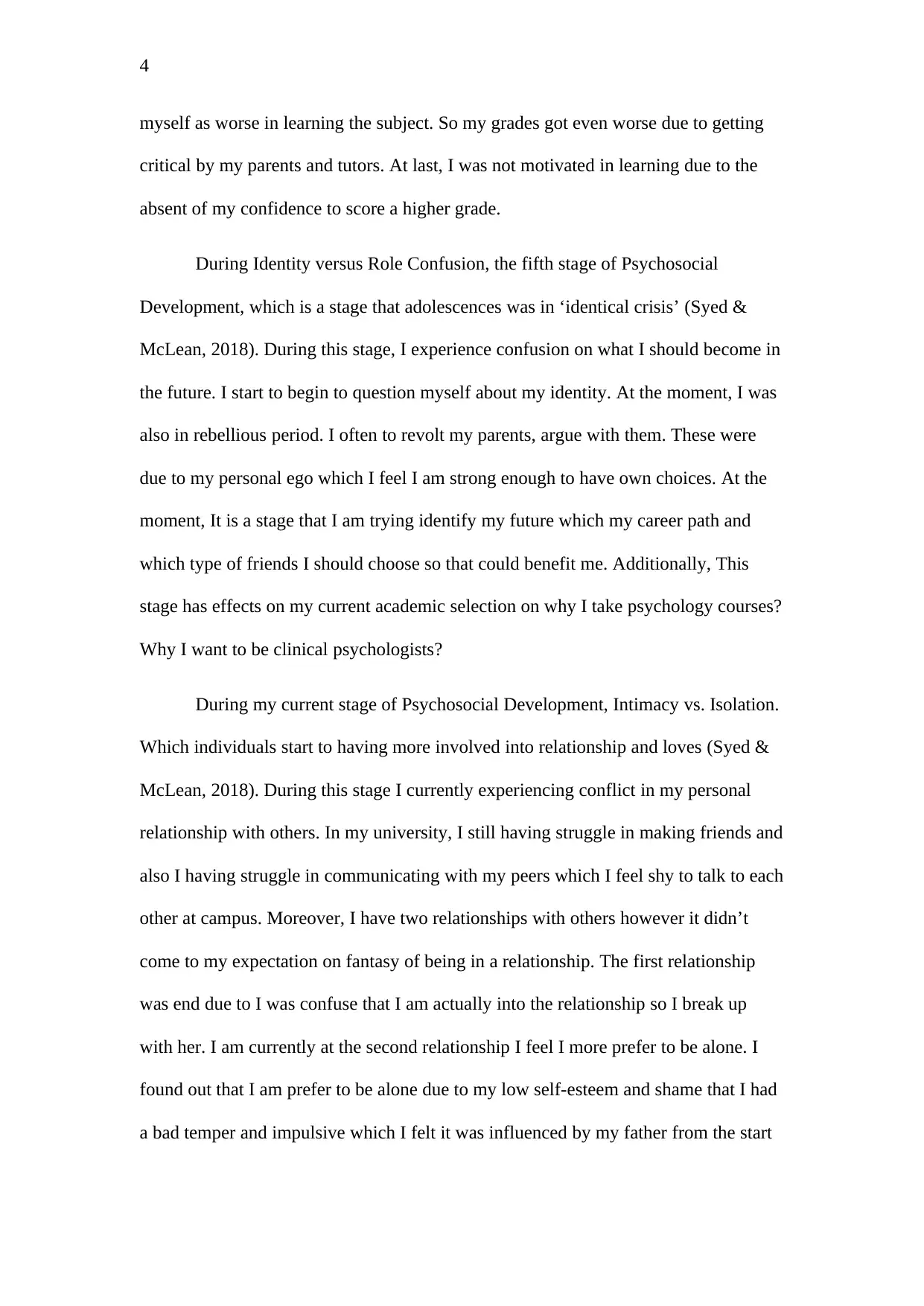
4
myself as worse in learning the subject. So my grades got even worse due to getting
critical by my parents and tutors. At last, I was not motivated in learning due to the
absent of my confidence to score a higher grade.
During Identity versus Role Confusion, the fifth stage of Psychosocial
Development, which is a stage that adolescences was in ‘identical crisis’ (Syed &
McLean, 2018). During this stage, I experience confusion on what I should become in
the future. I start to begin to question myself about my identity. At the moment, I was
also in rebellious period. I often to revolt my parents, argue with them. These were
due to my personal ego which I feel I am strong enough to have own choices. At the
moment, It is a stage that I am trying identify my future which my career path and
which type of friends I should choose so that could benefit me. Additionally, This
stage has effects on my current academic selection on why I take psychology courses?
Why I want to be clinical psychologists?
During my current stage of Psychosocial Development, Intimacy vs. Isolation.
Which individuals start to having more involved into relationship and loves (Syed &
McLean, 2018). During this stage I currently experiencing conflict in my personal
relationship with others. In my university, I still having struggle in making friends and
also I having struggle in communicating with my peers which I feel shy to talk to each
other at campus. Moreover, I have two relationships with others however it didn’t
come to my expectation on fantasy of being in a relationship. The first relationship
was end due to I was confuse that I am actually into the relationship so I break up
with her. I am currently at the second relationship I feel I more prefer to be alone. I
found out that I am prefer to be alone due to my low self-esteem and shame that I had
a bad temper and impulsive which I felt it was influenced by my father from the start
myself as worse in learning the subject. So my grades got even worse due to getting
critical by my parents and tutors. At last, I was not motivated in learning due to the
absent of my confidence to score a higher grade.
During Identity versus Role Confusion, the fifth stage of Psychosocial
Development, which is a stage that adolescences was in ‘identical crisis’ (Syed &
McLean, 2018). During this stage, I experience confusion on what I should become in
the future. I start to begin to question myself about my identity. At the moment, I was
also in rebellious period. I often to revolt my parents, argue with them. These were
due to my personal ego which I feel I am strong enough to have own choices. At the
moment, It is a stage that I am trying identify my future which my career path and
which type of friends I should choose so that could benefit me. Additionally, This
stage has effects on my current academic selection on why I take psychology courses?
Why I want to be clinical psychologists?
During my current stage of Psychosocial Development, Intimacy vs. Isolation.
Which individuals start to having more involved into relationship and loves (Syed &
McLean, 2018). During this stage I currently experiencing conflict in my personal
relationship with others. In my university, I still having struggle in making friends and
also I having struggle in communicating with my peers which I feel shy to talk to each
other at campus. Moreover, I have two relationships with others however it didn’t
come to my expectation on fantasy of being in a relationship. The first relationship
was end due to I was confuse that I am actually into the relationship so I break up
with her. I am currently at the second relationship I feel I more prefer to be alone. I
found out that I am prefer to be alone due to my low self-esteem and shame that I had
a bad temper and impulsive which I felt it was influenced by my father from the start
Paraphrase This Document
Need a fresh take? Get an instant paraphrase of this document with our AI Paraphraser
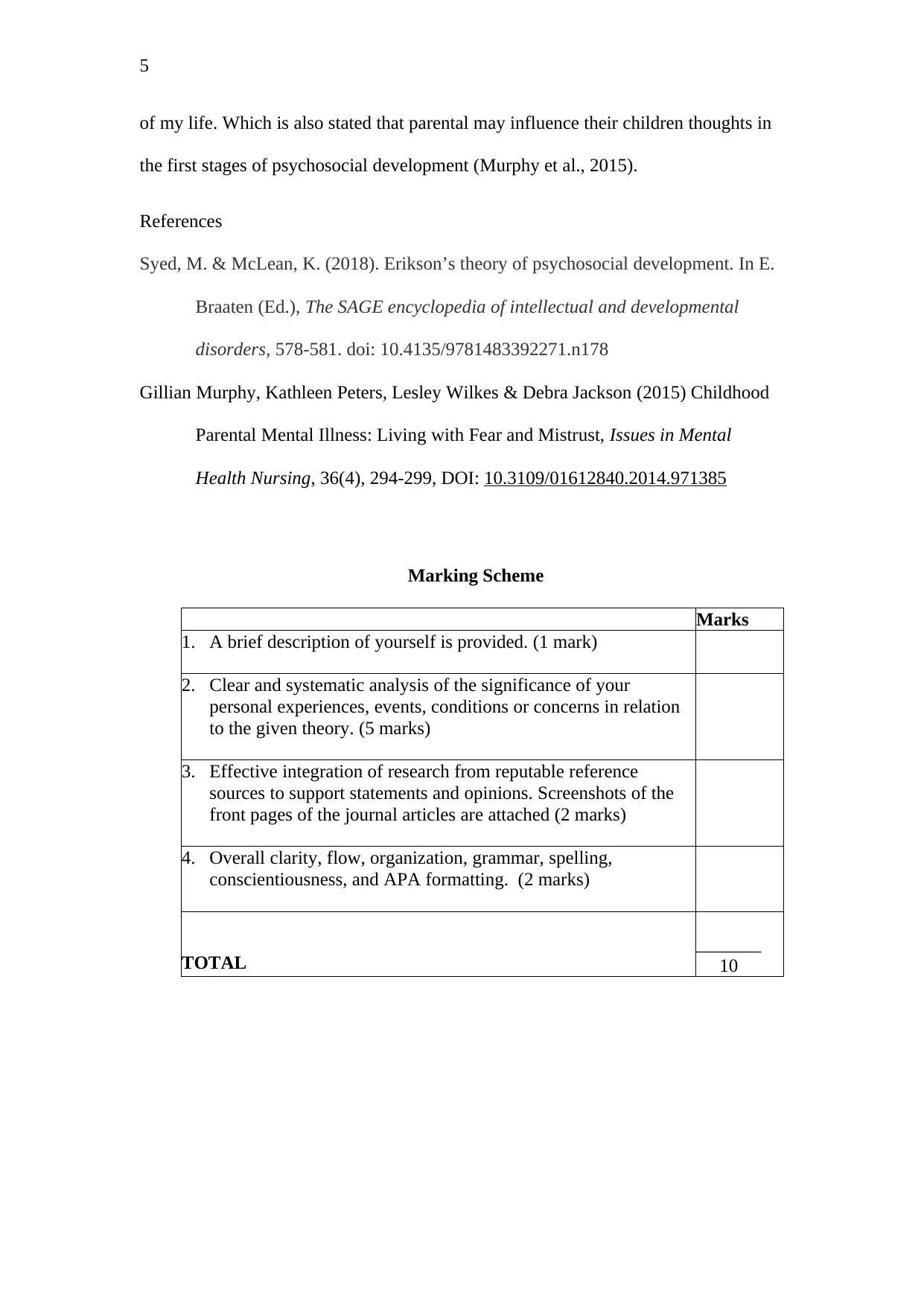
5
of my life. Which is also stated that parental may influence their children thoughts in
the first stages of psychosocial development (Murphy et al., 2015).
References
Syed, M. & McLean, K. (2018). Erikson’s theory of psychosocial development. In E.
Braaten (Ed.), The SAGE encyclopedia of intellectual and developmental
disorders, 578-581. doi: 10.4135/9781483392271.n178
Gillian Murphy, Kathleen Peters, Lesley Wilkes & Debra Jackson (2015) Childhood
Parental Mental Illness: Living with Fear and Mistrust, Issues in Mental
Health Nursing, 36(4), 294-299, DOI: 10.3109/01612840.2014.971385
Marking Scheme
Marks
1. A brief description of yourself is provided. (1 mark)
2. Clear and systematic analysis of the significance of your
personal experiences, events, conditions or concerns in relation
to the given theory. (5 marks)
3. Effective integration of research from reputable reference
sources to support statements and opinions. Screenshots of the
front pages of the journal articles are attached (2 marks)
4. Overall clarity, flow, organization, grammar, spelling,
conscientiousness, and APA formatting. (2 marks)
TOTAL _______
10
of my life. Which is also stated that parental may influence their children thoughts in
the first stages of psychosocial development (Murphy et al., 2015).
References
Syed, M. & McLean, K. (2018). Erikson’s theory of psychosocial development. In E.
Braaten (Ed.), The SAGE encyclopedia of intellectual and developmental
disorders, 578-581. doi: 10.4135/9781483392271.n178
Gillian Murphy, Kathleen Peters, Lesley Wilkes & Debra Jackson (2015) Childhood
Parental Mental Illness: Living with Fear and Mistrust, Issues in Mental
Health Nursing, 36(4), 294-299, DOI: 10.3109/01612840.2014.971385
Marking Scheme
Marks
1. A brief description of yourself is provided. (1 mark)
2. Clear and systematic analysis of the significance of your
personal experiences, events, conditions or concerns in relation
to the given theory. (5 marks)
3. Effective integration of research from reputable reference
sources to support statements and opinions. Screenshots of the
front pages of the journal articles are attached (2 marks)
4. Overall clarity, flow, organization, grammar, spelling,
conscientiousness, and APA formatting. (2 marks)
TOTAL _______
10
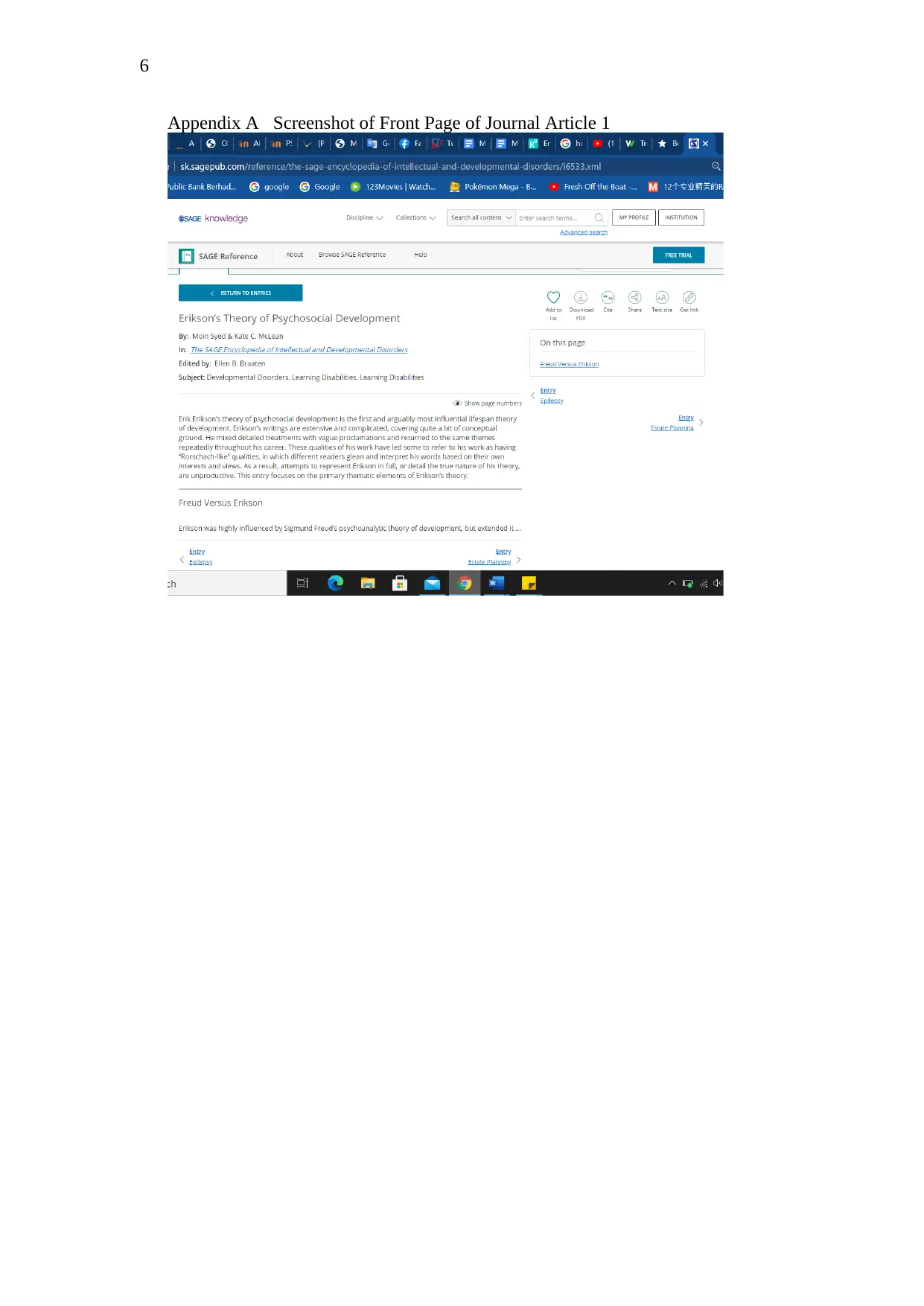
6
Appendix A Screenshot of Front Page of Journal Article 1
Appendix A Screenshot of Front Page of Journal Article 1
⊘ This is a preview!⊘
Do you want full access?
Subscribe today to unlock all pages.

Trusted by 1+ million students worldwide
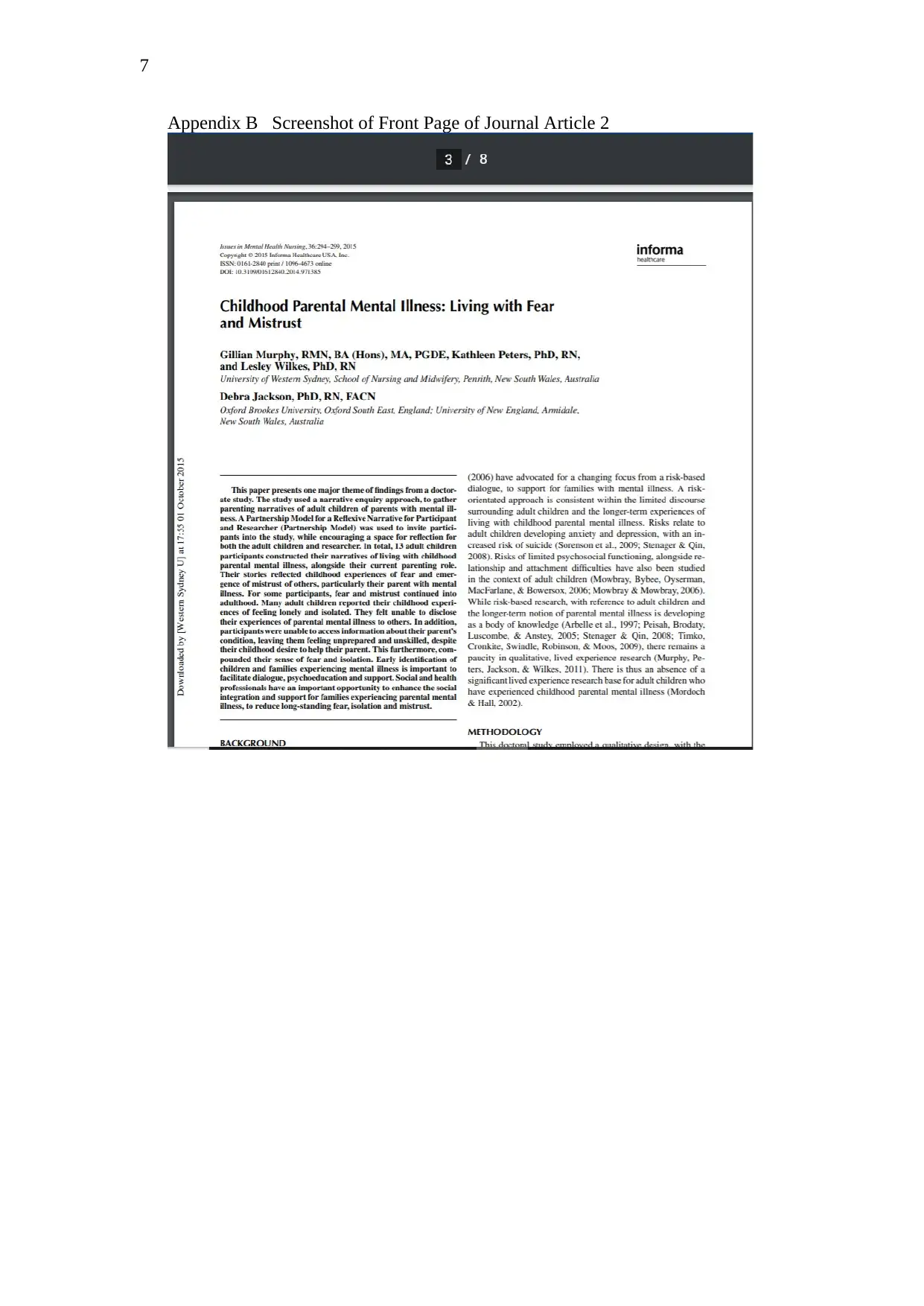
7
Appendix B Screenshot of Front Page of Journal Article 2
Appendix B Screenshot of Front Page of Journal Article 2
1 out of 7
Related Documents
Your All-in-One AI-Powered Toolkit for Academic Success.
+13062052269
info@desklib.com
Available 24*7 on WhatsApp / Email
![[object Object]](/_next/static/media/star-bottom.7253800d.svg)
Unlock your academic potential
Copyright © 2020–2026 A2Z Services. All Rights Reserved. Developed and managed by ZUCOL.





